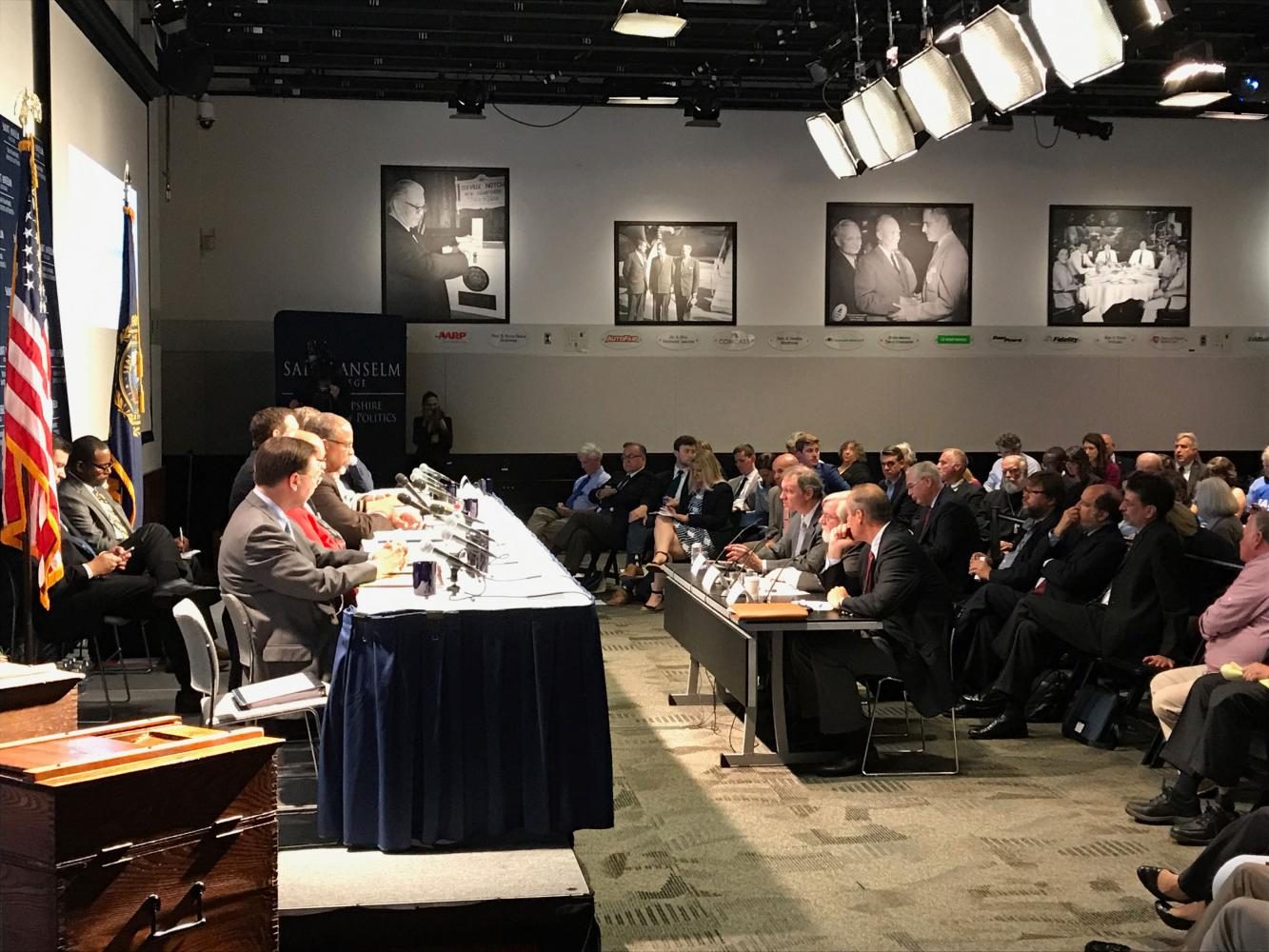Electoral Integrity Commission meets to discuss presidential elections
September 17, 2017
The second meeting of the Presidential Advisory Commission on Election Integrity was hosted by the New Hampshire Institute of Politics (NHIOP). This meeting was played out to a full house at the NHIOP on Tuesday, Sept. 12.
There were nearly 40 different members of the media in the auditorium for the event and several others in the computer lab watching the meeting on a live stream on the projector. In the audience were countless New Hampshire elected officials and private citizens interested in this topic.
According to the official White House website (WhiteHouse.gov), “On May 11, 2017, President Donald J. Trump signed an Executive Order establishing the Presidential Advisory Commission on Election Integrity. Vice President Mike Pence chairs the Commission, and Kansas Secretary of State Kris Kobach serves as the vice chair.”
The members of the commission are as follows: Vice President Mike Pence, Chair; Kris Kobach, Secretary of State of Kansas, Vice-Chair; Connie Lawson, Secretary of State of Indiana; Bill Gardner, Secretary of State of New Hampshire; Matthew Dunlap, Secretary of State of Maine; Ken Blackwell, Former Secretary of State of Ohio; Christy McCormick, Commissioner, Election Assistance Commission; and David Dunn, Former Arkansas State Representative;.
It also included Mark Rhodes, Clerk of Wood County, West Virginia; Hans von Spakovsky, Senior Legal Fellow and Manager of Election Law Reform Initiative, Edwin Meese Center for Legal & Judicial Studies, The Heritage Foundation;
Also featured on this panel were J. Christian Adams, President and General Counsel, Public Interest Legal Foundation; and Alan King, Probate Judge, Jefferson County, Alabama.
According to the official White House website (WhiteHouse.gov), Vice President Pence’s statement in the original press release read as follows, “We can’t take for granted the integrity of the vote. This bipartisan commission will review ways to strengthen the integrity of elections to protect and preserve the principle of one person, one vote because the integrity of the vote is the foundation of our democracy.”
The meeting at the NHIOP on Tuesday featured three panels of speakers. Panel one, titled The Effects of Election Integrity Issues, featured Dr. Andrew Smith, Associate Professor of Political Science at the University of New Hampshire. It also featured Kimball Brace, President, Election Data Services, Inc., and Dr. John Lott, Crime Prevention Research Center.
In this panel, the long discussions included Dr. Smith invoking historical data to speak to the turnout of voters in elections dating back to 1952. Dr. Lott also spoke about historical turn out, but in a widely different fashion.
Lott also talked about the National Instant Criminal Background Check System (NICS). Dr. Lott argued that NICS will “abridge” voting rights. He spoke to the evidence of voter fraud and the impact that regulations to reduce fraud have on voter participation rates.
He also asked the question, “Is it useful to look at percentage of the population with government issued photo IDs?” Dr. Lott used Mexico’s 1991 election reform as an example of a country effectively changing the voter registration process. His speech focused on election reform and voter fraud throughout the 2016 election.
In the second of three panels, Donald Palmer, Former Secretary, Virginia State Board of Elections; Robert Popper, Director, Election Integrity Project, Judicial Watch; Ken Block President, Simpatico Software Systems; and Hans von Spakovsky, Senior Legal Fellow, Heritage Foundation and Member, PACEI spoke about voter fraud, false registrations, duplicate voting, absentee ballot fraud, illegal assistance at the polls, and several other voting fraud issues.
Their discussions heavily considered proper voting and the ways to rectify the voting situation throughout the United States.
Finally, the last panel, titled Electronic Voting Systems and Election Integrity, consisted of Dr. Andrew Appel, Professor of Computer Science, Princeton University; Dr. Ronald Rivest, Professor of Computer Science, Massachusetts Institute of Technology; and Dr. Harry Hursti, Co-Founder of Nordic Innovation Labs. They investigated the issue of hacking an election.
The three men have a history of being extremely successful and well-known hackers. They denied that the 2016 election was hacked, but they were not entirely certain with their answers.
These men did list numerous ways that the election could have been hacked, which many took as a suggestion that the election might have been hacked.
After the event ended, New Hampshire Secretary of State William Gardner expressed his excitement over the commission and the event at the NHIOP.
He said, “Everything that I have heard from others was really positive [about the discussions at the NHIOP], and I felt really good about it myself. I think this will go a long way to getting this commission off the third rail and onto the main tracks.”



